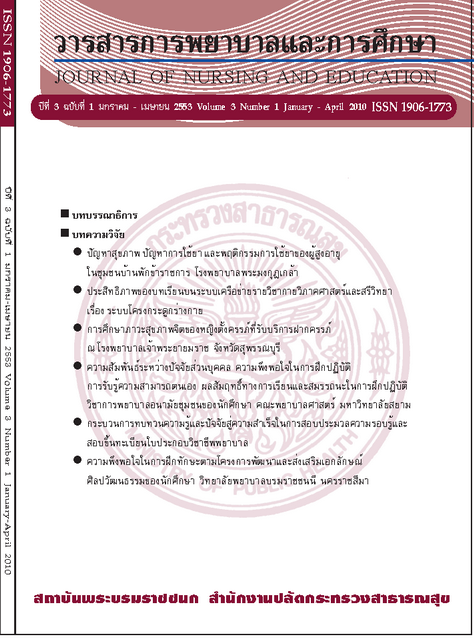กระบวนการทบทวนความรู้และปัจจัยสู่ความสำเร็จในการสอบประมวลความรอบรู้ และสอบขึ้นทะเบียนใบประกอบวิชาชีพพยาบาล
คำสำคัญ:
Reviewing process, Nursing Comprehensive Exam, Nursing License Examบทคัดย่อ
บทคัดย่อ
การวิจัยเชิงบรรยายนี้ มีวัตถุประสงค์เพื่อศึกษากระบวนการทบทวนความรู้ในการสอบ ประมวลความรอบรู้และสอบขึ้นทะเบียนใบประกอบวิชาชีพพยาบาลของนักศึกษาพยาบาล คณะพยาบาลศาสตร์ มหาวิทยาลัยสงขลานครินทร์ กลุ่มตัวอย่างเป็นนักศึกษาคณะพยาบาลศาสตร์ มหาวิทยาลัยสงขลานครินทร์ ที่สำเร็จการศึกษาในปีพ.ศ. 2552 และสอบประมวลความรอบรู้ และสอบขึ้นทะเบียนรับใบอนุญาตประกอบวิชาชีพพยาบาล ผ่านในรอบแรก จำนวน 9 คน เก็บรวบรวมข้อมูลระหว่างเดือนพฤศจิกายน 2552 ถึง มกราคม 2553 โดยการสนทนากลุ่ม สัมภาษณ์ และสังเกตขณะให้ข้อมูล ตรวจสอบข้อมูลด้วยการตรวจสอบแบบสามเส้าด้านวิธีรวบรวม ข้อมูล (methodological triangulation) วิเคราะห์ข้อมูลโดยใช้หลักการวิเคราะห์เนื้อหา (content analysis)
ผลการวิจัยพบว่านักศึกษาเตรียมตัวสอบ ด้วยการหาข้อมูลจากรุ่นพี่ และวางแผน การทบทวนความรู้ มีการทบทวนความรู้โดยอาจารย์ การอ่านหนังสือก่อนเข้าฟัง และอ่านทบทวน อีกครั้งหลังเข้าฟังอาจารย์ ทบทวนด้วยตนเองโดยอ่านหนังสือและทำแบบทดสอบ เริ่มอ่านหนังสือในช่วงปิดภาคเรียนที่ 1 และอ่านจริงจังในช่วง 2 เดือนก่อนสอบ วันเปิดเรียน อ่านตั้งแต่ เวลา 20.00 น.เป็นต้นไป รวม 2 - 6 ชั่วโมง ส่วนวันหยุด อ่านทั้งช่วงเช้า บ่าย กลางคืน และพักเป็นช่วงๆ รวม 6 - 8 ชั่วโมง วิธีการอ่านหนังสือ มีดังนี้ อ่านสม่ำเสมอ อ่านจบเป็นเรื่องๆ อ่าน 2 รอบโดยรอบแรกอ่านให้เข้าใจรอบหลังเน้นเนื้อหาสาระ อ่านหนักทีเดียว และมีการ จดบันทึกเนื้อหาที่สำคัญ อ่านรายวิชาที่รับรู้ว่าหนักหรือยากก่อน อ่านทุกหัวข้อ แต่อ่านเนื้อหา ที่คิดว่าสำคัญ และอ่านเพิ่มเติมในส่วนที่อาจารย์ทบทวนความรู้ เอกสารที่ใช้ อ่านประกอบด้วย เอกสารของอาจารย์ในคณะและต่างสถาบัน
ปัจจัยส่งเสริมการทบทวนความรู้ ได้แก่ การตั้งเป้าหมายและให้รางวัลเมื่อทำได้ ตามเป้าหมาย การทบทวนความรู้ของอาจารย์ การประชุมปรึกษากับอาจารย์ขณะขึ้นฝึกรายวิชา ปฏิบัติ การชี้แนะของเพื่อน คำพูดของเพื่อน ส่วนปัญหาอุปสรรคในการทบทวนความรู้ ได้แก่ ความเกียจคร้าน ความเครียดจากการอ่านหนังสือ ความเหนื่อยล้าจากการขึ้นฝึกรายวิชาปฏิบัติ เพื่อนชวนเที่ยว เสียงรบกวนจากหอพักใกล้เคียง สำหรับข้อเสนอแนะต่อการทบทวนความรู้ ของนักศึกษา มีดังนี้ ให้นักศึกษาทบทวนเนื้อหาในช่วงที่เรียนและทบทวนอีกครั้งเมื่อใกล้สอบ ให้อาจารย์จัดทำสรุปเนื้อหาสำคัญของรายวิชา แบบทดสอบให้ฝึกทำในช่วงทบทวนความรู้ และจัดเวลาให้นักศึกษาทบทวนความรู้ก่อนสอบ 2 สัปดาห์
Abstract
This study was designed to explore the nursing student reviewing process for taking the nursing comprehensive and the licensing exam. Focus groups were used to obtain student’s opinions and experiences regarding their reviewing processes. Nine baccalaureate nursing students of the Faculty of Nursing, Prince of Songkla University who passed the first round of comprehensive exam were selected to be research participation volunteers. Data were collected between November and January, 2009, and then analyzed using Content analysis.
The study found that, during the reviewing process, the participants adopted several ways to review their lessons. The means were seeking for the information relevant to the previous examination from former students, planning and setting a schedule for the test preparation, reading before and after tutorial sections, preparing themselves individually by reading and tests practicing. They started the test preparing during the first semester break and began their intensive reading by the last two months before the examination. During weekdays, the participants spent 2 to 6 hours per day and started reading at 8 pm. For weekends, they spent the whole day reading. The participants applied several different ways of reading including, regular reading, one-off intensive reading, reading twice in which the first reading aiming at getting a big picture and the second aiming at getting in-depth understanding, taking note together with intensive reading, beginning reading with the most complicated subject, reading every topic focusing on the main important contents, and the contents that the tutor emphasized. Furthermore, they reviewed various documents including the worksheets, notes, and tests examples written by both participants’ teachers and others.
The factors facilitating the reviewing process were goal setting and rewarding, tutoring conference during field practice and friend’s suggestion and guidance. The factors hindering the reviewing process were laziness, tension from reading, feeling of tiredness after clinical practice, distracted both by friends and by noisy environment. Overall suggestion for the reviewing process was that the students should focus on the content while attending lectures in their classrooms and reviewing what they have learned as well as constantly assessing and re-evaluating their knowledge when the examination is approaching. Furthermore, the lecturers should formulate an exam preparation summary, as well as organize some tests and quizzes during the reviewing process. Lastly, the participants strongly recommended that they should be free from other activities for 2 weeks prior to the examination.






